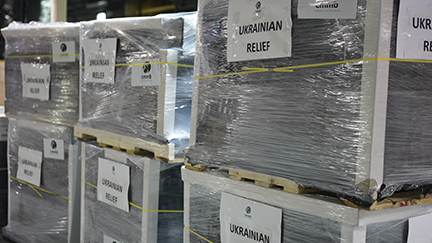Use opengraph image in content:
No
Display related media icon:
No
By LISA EISENHAUER
In the year since Russia invaded, Catholic relief groups have swept into Ukraine to provide aid — housing, meals, medical care and psychosocial support — to the war's victims there and wherever they've taken refuge, all the while assisting people in crises elsewhere around the globe.

Medicine, personal protective equipment and hygiene kits wait on pallets to be shipped to Ukraine at the Catholic Medical Mission Board's distribution center in New York in June.
Credit: Catholic Medical Mission Board
Bruce Compton, CHA's senior director of global health, hosted a networking call with several representatives of the relief groups on the eve of the one-year anniversary of Russia's first strike on Feb. 24, 2022.
"We come together today as CHA members and their partners who have joined with people of faith and goodwill from across the world to provide resources for the people of Ukraine and support for those who are caring for the people of Ukraine and for the refugees in those countries surrounding Ukraine," Compton said.
He referenced the appeal made a day earlier by Pope Francis for a ceasefire and peace negotiations to end the conflict. The pope called the war "absurd and cruel." The United Nations says the fighting has killed at least 8,000 civilians and injured more than 13,000. The combat also has left 18 million people in "dire need of humanitarian assistance" and displaced 14 million Ukrainians from their homes, the U.N. says.
Coordinated response
CHA is part of Catholic Response for Ukraine, a self-described working group of "major global Catholic-inspired humanitarian organizations" convened at the request of the Vatican. Msgr. Robert J. Vitillo, secretary general of the International Catholic Migration Commission, leads Catholic Response for Ukraine and gave a rundown of the coordinated efforts of its member groups during the networking call.
He said the two Ukraine-based Caritas groups have provided food and daily necessities to 1.7 million people, shelter to 600,000, medical and psychological support to 190,000, and cash assistance to 106,000. The Order of Malta has supplied 480,000 meals and 19,000 beds in shelters, provided mental health care to 31,000 people and other psychological support to 18,500 people, and trained 13,175 people in first aid.
Msgr. Vitillo said the need for aid in Ukraine will be long term, regardless of when the combat ends. He noted that he had learned over the summer that Ukraine has the largest minefield — an area about the size of Virginia, Maryland and Connecticut combined — of anywhere in the world. The bombs are being planted by both sides in the fighting, according to the nonprofit Human Rights Watch.
"It will take years to clear those landmines, and those of us who worked in Southeast Asia know that some of them never get found and continue to do damage to people," Msgr. Vitillo said.
One of the ways that Catholic health systems have helped, he said, has been by providing prosthetics for amputees. He said he hopes to see that aid expand. He also hopes for donations of ambulances.
Sending only what's requested
Within the next six weeks, a 40-foot shipping container of medicine and medical equipment procured by Hospital Sisters Mission Outreach and the Catholic Medical Mission Board is due to arrive in Ukraine. The Knights of Columbus is arranging the shipment.
Erica Smith, president and executive director of Hospital Sisters Mission Outreach, said during the call that her organization isn't sending any supplies into Ukraine until the goods are requested. Sending unrequested supplies, she noted, can lead to what she called "the second disaster."
"Our good intentions can unfortunately go awry for people who are already in the middle of a crisis trying to store and distribute and maintain and use medical supplies and equipment safely and appropriately," Smith said.
Bill O'Keefe, executive vice president for mission and mobilization at Catholic Relief Services, said his organization is working with Caritas groups to provide humanitarian support at 168 sites in Ukraine. The support includes operating reception centers and field kitchens for displaced residents and providing shelter and counseling and other care to address psychosocial needs.
"I wish American Catholics could fully grasp what all of us have an opportunity to see, which is just how amazing the global Catholic church's response is in so many different ways," O'Keefe said.
Crises elsewhere
He noted that the outpouring of assistance has come as his organization and other relief groups have continued their commitments to people in other troubled zones such as the West Bank, Yemen and the Sahel Region of West Africa.
The ongoing humanitarian crises in those places have been exacerbated by the fighting in Ukraine, O'Keefe said, because many of the food shipments those regions rely originate in Ukraine and Russian and have been interrupted; assistance that might have come to them has been diverted to the warzone.
Brian Corbin, executive vice president of Catholic Charities USA, discussed how his organization is assisting Ukrainian refugees who are resettling at least temporarily in the United States.
Vitillo pointed out that, in line with the wishes of the Vatican, many of the organizations are working as partners rather than operating on parallel tracks. "I think the more we can do together the better," he said.